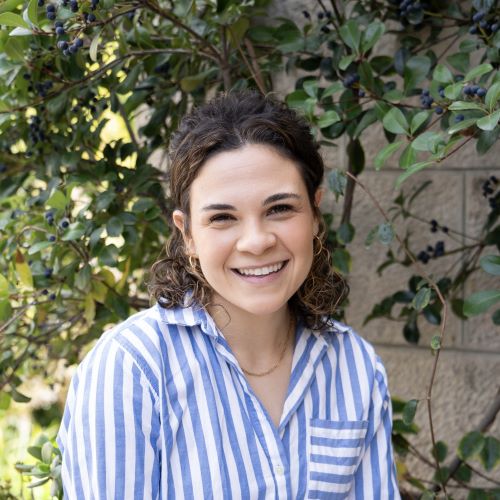Michal Fromowitz
Credentials
Finances
Licensed in Israel
- Online only
- Virtual therapy
Michal Fromowitz
 Verified
Verified
Credentials
Clinical Social Worker
MSW, BSW
Finances
250-350 NIS
None
Free Consultation
ABOUT THE THERAPIST
I support young Olim (20s and 30s) through life's transitions, offering a compassionate, down-to-earth space where you can be understood, learn yourself better, and build resilience as you navigate change.
I believe in a holistic approach to mental and physical health and draw from various modalities to provide the best treatment for each individual client. Therapy is not only a troubleshooting tool to use when we're struggling. I strongly believe it is also an opportunity to learn skills and tools when things are "going well" that we can then tap back into when we're struggling.
I help clients struggling with anxiety, transitions, relationship dynamics, feeling stuck, low self-esteem and other challenges that may arise during this stage of life.
I create a safe, non-judgemental space that allows you to feel comfortable and heard. My goal is to be a compassionate presence enabling you to explore patterns, behaviors, and beliefs about yourself to help you better navigate your life.
Together, we'll develop a therapy process that works for you, encouraging you to take charge while offerring support along your journey.
My practice is entirely virtual, enabling you to step into our sessions from the comfort of your home.
I offer a sliding scale due to the ongoing war, so please feel free to reach out.
I speak both English and Hebrew fluently and offer therapy in both languages.
QUALIFICATIONS
MSW
Yeshiva University
2023
BSW
Ariel University
2018
Degree
MSWEducation
Yeshiva UniversityYear of Graduation
2023Degree
BSWEducation
Ariel UniversityYear of Graduation
2018Years in Practice
6
LICENSED IN ISRAEL
Registered Social Worker in Israel
35884
ADDITIONAL CREDENTIALS
Certificate of Play Therapy, 2023
DISTANCE COUNSELING
Online Therapy
PRIMARY SPECIALTIES
Adjustments
Anxiety / Panic
Family Issues
Life Transitions
Self-Esteem
ADDITIONAL SPECIALTIES
Stress Management
CLIENT FOCUS
Population
Adults
Men
Women
Languages Spoken
Hebrew
English
TREATMENT APPROACH
Existential PsychotherapyExistential psychotherapy is a form of psychotherapy that emphasizes an individual’s subjective experience of existence. It is a philosophical approach to psychotherapy that views the individual as ultimately responsible for creating a meaningful life. This form of psychotherapy helps individuals explore their subjective experiences, understand their personal values and beliefs, find ways to live more authentically, and make meaningful choices. The ultimate goal is to help the individual reach a greater sense of self-awareness and personal fulfillment.
Person-Centered Therapy (Rogerian Therapy)Person-centered therapy, or Rogerian therapy, was developed by Carl Rogers in the 1940’s. It is a form of talk therapy that emphasizes the importance of providing psychological safety, unconditional positive regard, and empathic understanding to clients. This type of therapy is based on the belief that individuals have an innate capacity for self-actualization and self-understanding and that the therapist's role is to provide a supportive environment in which this process can take place. Through the use of active listening, open-ended questions, and non-judgmental reflection, the therapist helps the client to explore their thoughts, feelings, and experiences in a safe and accepting environment. By doing so, clients are able to gain insight into their issues, develop a greater understanding of themselves, and work towards personal growth.
Play TherapyPlay therapy is an evidence-based, developmentally appropriate form of intervention used to facilitate emotional, cognitive, and social growth in children. Play therapy is based on the premise that play is the child's natural medium of self-expression and can be used to assess and help a child work through difficult emotions, thoughts, and behaviors. The goal of play therapy is to help children develop the skills and abilities to navigate life stressors, and build self-esteem. During treatment, the therapist creates a comfortable, safe environment (a playroom) for the child to play with as few limits as possible. The toys in the playroom are intended to encourage the child to express his or her feelings and develop healthier behaviors. The child’s “play” with these toys serve as the child’s symbolic words, which may be difficult to express otherwise.
Psychodynamic TherapyPsychodynamic therapy is a form of therapy that focuses on the unconscious mind and how it affects behavior. It works to help people understand and work through past experiences and feelings that may be causing difficulties in the present. This type of therapy encourages individuals to explore their emotions, relationships, and behaviors in order to gain insight into their current difficulties. It can help individuals better understand themselves and their motivations, and gain insight into how past events have impacted their current lives. People tend to develop defense mechanisms when faced with challenges in life. Defense mechanisms may keep painful feelings, memories, and experiences in the unconscious. A few common defense mechanisms include: denial, repression, and rationalization. Psychodynamic therapists encourage people to speak freely about their emotions, desires, and fears. Being open may help uncover vulnerable feelings that have been pushed out of conscious awareness. According to psychodynamic theory, behavior is influenced by unconscious thought. Once painful feelings are brought forth and processed, the defense mechanisms are no longer needed and a person in treatment can start changing unhelpful patterns when coping with life’s challenges.
SERVICES OFFERED
Individual Therapy

 Verified
Verified

